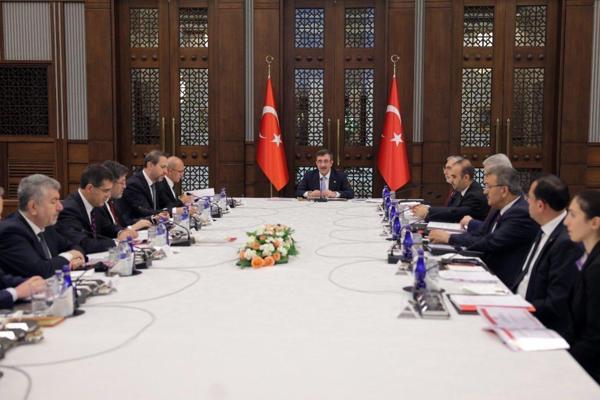Government’s medium-term program to be revised: Yılmaz
ISTANBUL


The government is considering revising the medium-term program in September, Vice President Cevdet Yılmaz has said.
The revised program will provide a framework for fiscal and monetary policies and include structural reforms, Yılmaz said in an interview with private broadcaster CNN Türk.
The government announced the medium-term program, which covers the 2023-2025 period, in September 2022.
The revised program will contain new three-year predictions and targets, Yılmaz said, adding that there will be consultations with related parties in preparations.
“This document will provide predictability. We now have predictable five-year perspectives. We will overcome hardships with stability and confidence.”
Yılmaz noted that the Turkish economy recorded strong growth rates in the past three years while global growth remained sluggish.
“However, at the same time, we have been facing problems such as rising prices and other social issues. Now it is time for an all-out struggle against inflation,” the vice president said.
Developments in the global economy, such as weak growth and lower energy prices, will help to bring the inflation rate in Türkiye down, Yılmaz noted.
Inflation started to decline, and the outlook on this front will improve further in the upcoming period, he said, reiterating that the government has taken and will continue to take measures to protect working people against inflation.
According to the latest official data, the annual inflation rate, which hit 86 percent last year, slowed from 43.7 percent in April to 39.6 percent in May.
“The foreign exchange rates will stabilize as exports rise and by taking measures which help increase FX revenues. Our aim is to diversify instruments to finance investments with higher savings. We need to boost domestic savings while reducing the current account deficit,” Yılmaz said.
The current level of foreign exchange rates should not cause worries, Yılmaz added, noting that the Turkish banking system is strong and sound.
The FX-protected deposit account scheme should not be exited immediately, the government will do it gradually, Yılmaz said, noting that some $120 billion is currently deposited in those accounts.
The scheme may be extended beyond the end of 2023, he added. “We will facilitate this transition with the new instrument we offer.”
In his earlier remarks in the day, following the Economic Coordination Board meeting, Yılmaz said that the government will take steps with determination to raise competitiveness and productivity within the free market rules.
Finance Minister Mehmet Şimşek, newly appointed Central Bank Governor Hafize Gaye Erkan and several other key ministers attended the board meeting.
Şimşek meets with businesspeople, bankers
Treasury and Finance Minister Mehmet Şimşek, who took the helm of the economy management after last month’s elections, has met with businesspeople and bankers in Istanbul.
Earlier in the day, Şimşek had a meeting with members of the Turkish Industry and Business Association (TÜSİAD).
“We shared our assessments and proposals regarding the economic situation. It was a sincere meeting,” said Tuncay Özilhan, the president of TÜSİAD’s High Advisory Council.
The association thanked the minister for the meeting in a Twitter post.
TÜSİAD represents the country’s leading 4,500 companies. Members companies account for 85 percent of Türkiye’s exports and more than 50 percent of the non-agricultural and non-governmental workforce.
Later in the day, Şimsek also met with members of the Banks Association of Türkiye.
In his remarks shortly after his appointment to the post, Şimşek said that the country has no choice but to return to “rational ground” to ensure predictability in the economy.
“Our guiding principles for creating a more prosperous and resilient Türkiye will be transparency, consistency, accountability and predictability,” Şimsek wrote on Twitter on June 7.
“As we navigate through domestic and international challenges, we affirm our commitment to rule-based policymaking to enhance predictability,” he added.
